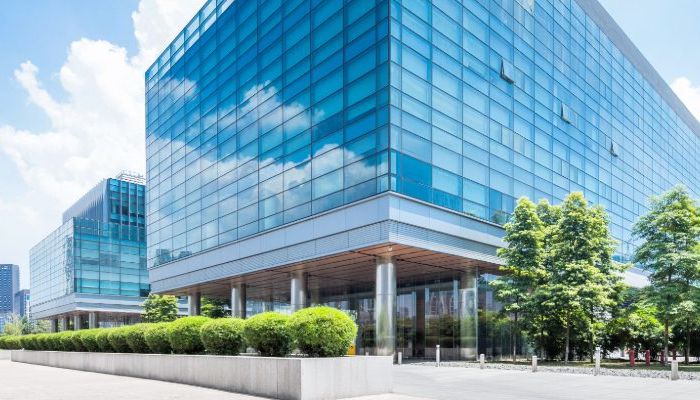The job of facilities management teams has been transformed over the past five years, as social, political, and economic factors compelled changes to the way buildings are designed, operated, and maintained. No longer “just” the people responsible for keeping the lights on and the air conditioning running, facility managers (FMs) are now expected to help organizations optimize space utilization, comply with environmental regulations, and enhance the wellbeing of building occupants.
These added functions have given FMs a more prominent role in making decisions about the buildings and portfolios with which they’re involved. Workplace management and smart building solutions are helping FMs succeed in that role, changing the perception of their job from sitting outside “the room where it happens” to having a seat at the table. As businesses finally settle into a less volatile, more stable “new norm,” FMs will wield technology to become even more essential to clients, occupants and other stakeholders.
It’s an exciting time to be associated with the facilities management industry, so we’ve asked members of the FM:Systems executive leadership team to share the top facilities management trends that they expect to have an impact on the sector in 2025.
Trend 1: Navigating Regulatory Uncertainty
The past few years have seen the proliferation of environmental reporting and building performance laws aimed at reducing the built environment’s contributions to climate change. Complying with these regulations requires the collection, management and manipulation of huge amounts of data. Using smart building technology, FMs have been instrumental in facilitating that process.
“As all sectors and industries across all geographies continue to develop their net zero green house gas strategies, react to local regulations and develop reporting ,” said Stephen Pyatt, Director of Strategy. “Smart building solutions – and the FMs who know how to use them – will be indispensable in helping stakeholders understand how their portfolios are affecting and impacting their targets to net zero and adjust accordingly.”
Trend 2: The Dust Settles on Work Models
More than half of respondents to our 2025 Inside the Workplace Survey said that employees are spending more time in the office than they were a year ago, and big-name employers like Starbucks, Amazon, and even Zoom are mandating that workers return to the office. As organizations continue to entice (or compel) employees back to the office, FMs will help organizations deliver workplaces that employees are happy to return to.
“Leaders may have their convictions about the benefits full-time in-office will bring to their business, but an unhappy and unproductive workforce will undermine many of those benefits,” said Andrew Butterworth, VP of Strategy. “In 2025, FMs will leverage the power of data, sensors and technology to deliver office spaces that boost morale, encourage collaboration, and enhance occupant wellness, safety and security.”
Trend 3: Casting a Wider Net for FM Talent
For years, the facilities management field has struggled to attract new entrants, thanks in large part to the perception that the work is low-tech and the workforce is homogenous. (The latter, at least, isn’t entirely wrong. According to data compiled by Zippia, males outnumber females in facilities management three to one, and the workforce is 67% White.) This failure to establish a healthy pipeline of future FMs has led to a critical worker shortage, with 43% of respondents to a recent JLL study reporting that their facilities management teams are understaffed.
Smart building solutions are helping the facilities management industry both alleviate the strain of worker shortages and entice members of the digital-native generations who are looking for careers involving technology. Systems like FMS:Insights are streamlining tasks so facilities management firms can maintain high levels of service with less staff. Meanwhile, industry organizations are taking steps to get the word out to students and others about what being an FM actually involves, and the opportunities the field offers.
“Sensors, data, AI, automation, machine learning… It’s hard to find an online article about facilities management today that doesn’t also mention these innovations. Sustainability is also becoming a big part of what FMs do, and that’s an important issue for Millennials and GenZers,” said Jennifer Heath, Director of Product Marketing. “I think 2025 is the year we’ll see a marked increase in the level of interest the field receives, not just from the younger cohort, but across the board.
Trend 4: Impact of Generative Artificial Intelligence and Other Innovations
Obviously, generative artificial intelligence (GenAI) is doing more for facilities management than just helping to pique the interest of potential future FMs. GenAI is enabling smart building platforms to progress from just encapsulating and delivering information to extracting deeper, more complex insights from data. Advanced platforms are even empowering building systems to act on those insights.
The infusion of GenAI into workplace management and building automation systems is also, somewhat ironically, making it easier for people to access and digest these more complicated insights, through natural language query tools like FM:Systems’ Simply Ask. The promise of GenAI to transform facilities management is so great that 76% of respondents to our 2025 Inside the Workplace survey indicated that they plan to deploy GenAI to assist with operations and maintenance of workplaces in the next year.
“History is filled with innovations that have been overhyped and end up either dying out or being rendered obsolete by future advances,” said Brian Haines, Chief Strategy Officer at FM:Systems. “2025 will be the year GenAI, machine learning and automation really demonstrate that they’re not just a flash in the pan, that they are the doorway we’ll step through into the autonomous building era.”
Facilities management has always been a dynamic industry, but today it’s poised to play a leading role in how we work, interact with our workplace and even address climate change. The next year will be a pivotal and exciting time to continue witnessing the evolution of what it means to be an FM.










